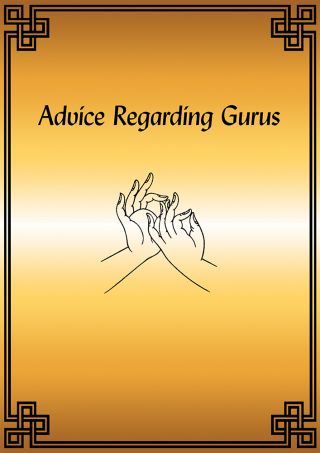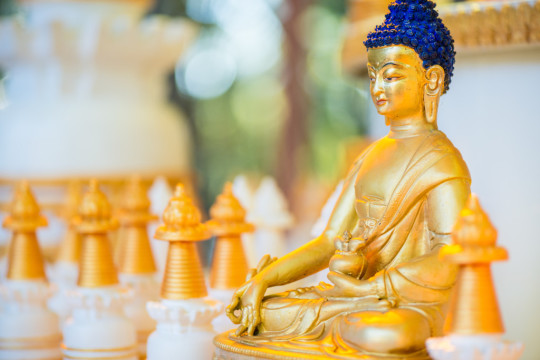- Home
- FPMT Homepage
Foundation for the Preservation of the Mahayana Tradition
The FPMT is an organization devoted to preserving and spreading Mahayana Buddhism worldwide by creating opportunities to listen, reflect, meditate, practice and actualize the unmistaken teachings of the Buddha and based on that experience spreading the Dharma to sentient beings. We provide integrated education through which people’s minds and hearts can be transformed into their highest potential for the benefit of others, inspired by an attitude of universal responsibility and service. We are committed to creating harmonious environments and helping all beings develop their full potential of infinite wisdom and compassion. Our organization is based on the Buddhist tradition of Lama Tsongkhapa of Tibet as taught to us by our founders Lama Thubten Yeshe and Lama Thubten Zopa Rinpoche.
- Willkommen
Die Stiftung zur Erhaltung der Mahayana Tradition (FPMT) ist eine Organisation, die sich weltweit für die Erhaltung und Verbreitung des Mahayana-Buddhismus einsetzt, indem sie Möglichkeiten schafft, den makellosen Lehren des Buddha zuzuhören, über sie zur reflektieren und zu meditieren und auf der Grundlage dieser Erfahrung das Dharma unter den Lebewesen zu verbreiten.
Wir bieten integrierte Schulungswege an, durch denen der Geist und das Herz der Menschen in ihr höchstes Potential verwandelt werden zum Wohl der anderen – inspiriert durch eine Haltung der universellen Verantwortung und dem Wunsch zu dienen. Wir haben uns verpflichtet, harmonische Umgebungen zu schaffen und allen Wesen zu helfen, ihr volles Potenzial unendlicher Weisheit und grenzenlosen Mitgefühls zu verwirklichen.
Unsere Organisation basiert auf der buddhistischen Tradition von Lama Tsongkhapa von Tibet, so wie sie uns von unseren Gründern Lama Thubten Yeshe und Lama Thubten Zopa Rinpoche gelehrt wird.
- Bienvenidos
La Fundación para la preservación de la tradición Mahayana (FPMT) es una organización que se dedica a preservar y difundir el budismo Mahayana en todo el mundo, creando oportunidades para escuchar, reflexionar, meditar, practicar y actualizar las enseñanzas inconfundibles de Buda y en base a esa experiencia difundir el Dharma a los seres.
Proporcionamos una educación integrada a través de la cual las mentes y los corazones de las personas se pueden transformar en su mayor potencial para el beneficio de los demás, inspirados por una actitud de responsabilidad y servicio universales. Estamos comprometidos a crear ambientes armoniosos y ayudar a todos los seres a desarrollar todo su potencial de infinita sabiduría y compasión.
Nuestra organización se basa en la tradición budista de Lama Tsongkhapa del Tíbet como nos lo enseñaron nuestros fundadores Lama Thubten Yeshe y Lama Zopa Rinpoche.
A continuación puede ver una lista de los centros y sus páginas web en su lengua preferida.
- Bienvenue
L’organisation de la FPMT a pour vocation la préservation et la diffusion du bouddhisme du mahayana dans le monde entier. Elle offre l’opportunité d’écouter, de réfléchir, de méditer, de pratiquer et de réaliser les enseignements excellents du Bouddha, pour ensuite transmettre le Dharma à tous les êtres. Nous proposons une formation intégrée grâce à laquelle le cœur et l’esprit de chacun peuvent accomplir leur potentiel le plus élevé pour le bien d’autrui, inspirés par le sens du service et une responsabilité universelle. Nous nous engageons à créer un environnement harmonieux et à aider tous les êtres à épanouir leur potentiel illimité de compassion et de sagesse. Notre organisation s’appuie sur la tradition guéloukpa de Lama Tsongkhapa du Tibet, telle qu’elle a été enseignée par nos fondateurs Lama Thoubtèn Yéshé et Lama Zopa Rinpoché.
Visitez le site de notre Editions Mahayana pour les traductions, conseils et nouvelles du Bureau international en français.
Voici une liste de centres et de leurs sites dans votre langue préférée
- Benvenuto
L’FPMT è un organizzazione il cui scopo è preservare e diffondere il Buddhismo Mahayana nel mondo, creando occasioni di ascolto, riflessione, meditazione e pratica dei perfetti insegnamenti del Buddha, al fine di attualizzare e diffondere il Dharma fra tutti gli esseri senzienti.
Offriamo un’educazione integrata, che può trasformare la mente e i cuori delle persone nel loro massimo potenziale, per il beneficio di tutti gli esseri, ispirati da un’attitudine di responsabilità universale e di servizio.
Il nostro obiettivo è quello di creare contesti armoniosi e aiutare tutti gli esseri a sviluppare in modo completo le proprie potenzialità di infinita saggezza e compassione.
La nostra organizzazione si basa sulla tradizione buddhista di Lama Tsongkhapa del Tibet, così come ci è stata insegnata dai nostri fondatori Lama Thubten Yeshe e Lama Zopa Rinpoche.
Di seguito potete trovare un elenco dei centri e dei loro siti nella lingua da voi prescelta.
- 欢迎 / 歡迎
简体中文
“护持大乘法脉基金会”( 英文简称:FPMT。全名:Foundation for the Preservation of the Mahayana Tradition) 是一个致力于护持和弘扬大乘佛法的国际佛教组织。我们提供听闻,思维,禅修,修行和实证佛陀无误教法的机会,以便让一切众生都能够享受佛法的指引和滋润。
我们全力创造和谐融洽的环境, 为人们提供解行并重的完整佛法教育,以便启发内在的环宇悲心及责任心,并开发内心所蕴藏的巨大潜能 — 无限的智慧与悲心 — 以便利益和服务一切有情。
FPMT的创办人是图腾耶喜喇嘛和喇嘛梭巴仁波切。我们所修习的是由两位上师所教导的,西藏喀巴大师的佛法传承。
繁體中文
護持大乘法脈基金會”( 英文簡稱:FPMT。全名:Found
ation for the Preservation of the Mahayana Tradition ) 是一個致力於護持和弘揚大乘佛法的國際佛教組織。我們提供聽聞, 思維,禪修,修行和實證佛陀無誤教法的機會,以便讓一切眾生都能 夠享受佛法的指引和滋潤。 我們全力創造和諧融洽的環境,
為人們提供解行並重的完整佛法教育,以便啟發內在的環宇悲心及責 任心,並開發內心所蘊藏的巨大潛能 — 無限的智慧與悲心 – – 以便利益和服務一切有情。 FPMT的創辦人是圖騰耶喜喇嘛和喇嘛梭巴仁波切。
我們所修習的是由兩位上師所教導的,西藏喀巴大師的佛法傳承。 察看道场信息:
- FPMT Homepage
- News/Media
-
- Study & Practice
-
-
- About FPMT Education Services
- Latest News
- Programs
- New to Buddhism?
- Buddhist Mind Science: Activating Your Potential
- Heart Advice for Death and Dying
- Discovering Buddhism
- Living in the Path
- Exploring Buddhism
- FPMT Basic Program
- FPMT Masters Program
- FPMT In-Depth Meditation Training
- Maitripa College
- Lotsawa Rinchen Zangpo Translator Program
- Universal Education for Compassion & Wisdom
- Online Learning Center
-
- Prayers & Practice Materials
- Overview of Prayers & Practices
- Full Catalogue of Prayers & Practice Materials
- Explore Popular Topics
- Benefiting Animals
- Chenrezig Resources
- Death & Dying Resources
- Lama Chopa (Guru Puja)
- Lama Zopa Rinpoche: Compendium of Precious Instructions
- Lama Zopa Rinpoche: Life Practice Advice
- Lama Zopa Rinpoche Practice Series
- Lamrim Resources
- Mantras
- Prayer Book Updates
- Purification Practices
- Sutras
- Thought Transformation (Lojong)
- Audio Materials
- Dharma Dates - Tibetan Calendar
- Translation Services
- Publishing Services
- Ways to Offer Support
- Prayers & Practice Materials
-
- Teachings and Advice
- Find Teachings and Advice
- Lama Zopa Rinpoche Advice Page
- Lama Zopa Rinpoche: Compendium of Precious Instructions
- Lama Zopa Rinpoche Video Teachings
- ༧སྐྱབས་རྗེ་བཟོད་པ་རིན་པོ་ཆེ་མཆོག་ནས་སྩལ་བའི་བཀའ་སློབ་བརྙན་འཕྲིན།
- Podcasts
- Lama Yeshe Wisdom Archive
- Buddhism FAQ
- Dharma for Young People
- Resources on Holy Objects
- Teachings and Advice
-
-
*If a menu item has a submenu clicking once will expand the menu clicking twice will open the page.
-
-
- Centers
-
- Teachers
-
- Projects
-
-
-
-
*If a menu item has a submenu clicking once will expand the menu clicking twice will open the page.
-
-
- FPMT
-
-
-
-
-
No matter whether you are a believer or a non-believer, religious or not religious, a Christian, Hindu, or a scientist, black or white, an Easterner or a Westerner, the most important thing to know is your own mind and how it works.
Lama Thubten Yeshe
-
-
-
- Shop
-
-
-
The Foundation Store is FPMT’s online shop and features a vast selection of Buddhist study and practice materials written or recommended by our lineage gurus. These items include homestudy programs, prayers and practices in PDF or eBook format, materials for children, and other resources to support practitioners.
Items displayed in the shop are made available for Dharma practice and educational purposes, and never for the purpose of profiting from their sale. Please read FPMT Foundation Store Policy Regarding Dharma Items for more information.
-
-
Study & Practice News
9
Prayers and Practices for the Time of Death
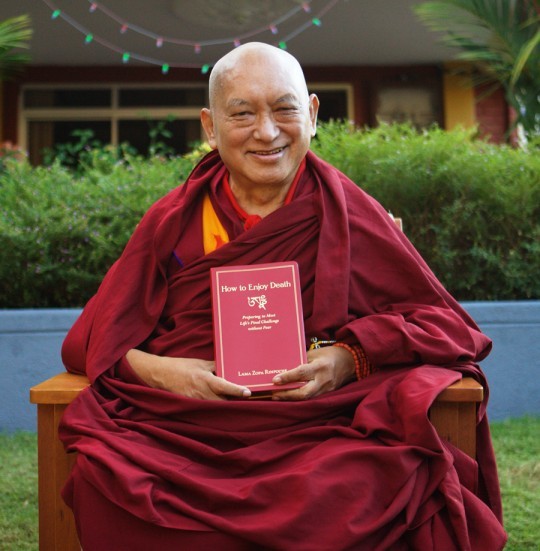
Lama Zopa Rinpoche with ‘How to Enjoy Death,’ Osel Labrang, Sera Monastery, India, December 2015.
Lama Zopa Rinpoche has given extensive advice and instruction for caring for ourselves and others during death and dying. FPMT Education Services would like to remind students of all the materials available to them for this critical time of transition.
Immediate Help
While Rinpoche’s advice on the subject has been vast, Medicine Buddha pujas and “Eight Prayers to Benefit the Dead” are the most recommended practices to do, should you need help immediately.
How to Enjoy Death
How to Enjoy Death: Preparing to Meet Life’s Final Challenge Without Fear brings together all the extensive commentary from Lama Zopa Rinpoche as well as a number of essential prayers, practices, and other materials that Lama Zopa Rinpoche has compiled over the years.
“We Buddhists all know about death and impermanence, but when death comes into our lives we often panic and don’t know what to do to help,” said Ven. Robina Courtin, the editor of How to Enjoy Death. “Rinpoche lays out all the instructions so clearly, one step at a time, for how to help our loved ones: what to do in the months and weeks before death, what to do in the hours before death, at the time the breath stops, and in the three days as well as the forty-nine days after death, including transforming our loved one’s ashes into a holy object.”
The condensed book of Rinpoche’s advice, Heart Practices for Death and Dying, contains the essential practices to do at the time of death.
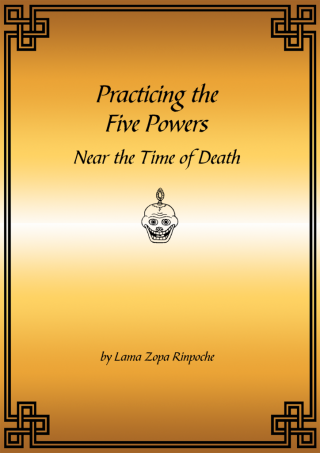
The Five Powers
Practicing the Five Powers Near the Time of Death by Lama Zopa Rinpoche contains advice and commentary to help ensure a peaceful death and positive rebirth. Although this book was intended for use by those facing imminent death, it is a deeply profound teaching on how to live life for anyone who wishes to make their life and eventual death most meaningful.
Rinpoche explains, “When you practice the five powers, every single thing you do is only for numberless sentient beings and therefore, everything you do only becomes the cause for achieving the peerless happiness of full enlightenment. This is the greatest profit that can be achieved with this life and so this practice is the most beneficial one for achieving peerless happiness. It means that every single action you do, whether it is meditation and prayers or doing your job, becomes the cause of happiness for all sentient beings. This means that you will have the best, happiest life now and also the best, happiest life in the future—like the sun shining in this world and eliminating all darkness.”

Heart Advice for Death and Dying
Heart Advice for Death and Dying is a collection of Lama Zopa Rinpoche’s essential advice and commentaries for the time of death. Teachings by Lama Zopa Rinpoche include, “The Nine-Point Meditation on Death,” “The Process of Dying,” “Preparing for Death,” “Practicing the Five Powers,” “Caring for the Dying and the Dead,” “Essential Activities at the Death Time,” and “Mantras to Benefit the Dying and Dead.” This collection also includes an MP3 CD of eleven hours of teachings on death by Ven. Sangye Khadro. In addition to the book and CD, this material is also available as a program for students more interested in structured study.
Available as:
- Hard copy book
- eBook
- FPMT Online Learning Center program
- Hard copy program for hosting centers
- PDF program for hosting centers
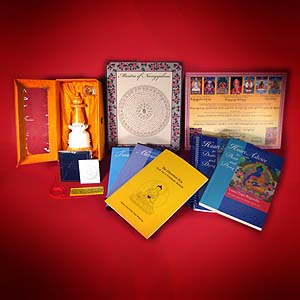
The Liberation Box contains many resources recommended by Lama Zopa Rinpoche to help at the time of death.
Liberation Box: Protection Tool for a Fortunate Rebirth
This invaluable collection of holy objects and essential blessed materials was put together on the advice of Lama Zopa Rinpoche.
Available as:
- Hard copy collection
- PDF digital edition, which does not include the stupa, phowa pill, and blessed cord
FPMT Education Services hopes that you will take full advantage of the resources available to you. Preparing for death is a wonderful service to offer oneself and our loved ones.
The FPMT Death and Dying Heart Practices and Advice webpage is kept up to date with all of Lama Zopa Rinpoche’s latest advice and materials concerning death and dying.
Through comprehensive study programs, practice materials, training seminars, and scholarships, FPMT Education nourishes the development of compassion, wisdom, kindness, and true happiness in individuals of all ages.
- Tagged: death, death and dying, dying
- 0
2
A Guide to Sanskrit Transliteration and Pronunciation
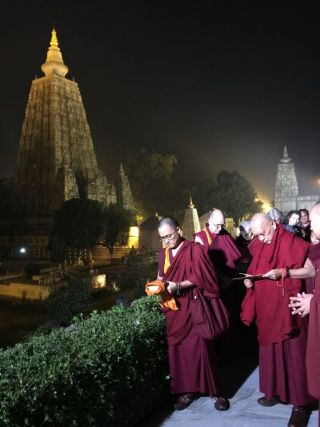
Lama Zopa Rinpoche with students at the Mahabodhi Stupa, Bodhgaya, India, February 2015.
FPMT Education Services is pleased to offer a new resource for FPMT students, A Guide to Sanskrit Transliteration and Pronunciation. We will soon begin releasing texts using transliterated Sanskrit and this document will help students with the reading and pronunciation of Sanskrit.
Lama Zopa Rinpoche places great importance on the correct pronunciation of Sanskrit mantras. For this reason, and following careful consideration, FPMT Education Services and FPMT Translation Services have decided to adopt the use of the standard international system for transliterating Sanskrit. This transliteration scheme, which entails the use of diacritical marks, will primarily be used in translations of Tibetan and Sanskrit texts.
In practice texts, transliteration will be restricted to cases where the Sanskrit is also transliterated in the Tibetan source text, which are usually mantras and seed syllables, and short phrases of homage. We will also be using in practice texts a modified form of transliteration, similar to that employed by Jeffrey Hopkins in many of his works, which will facilitate the pronunciation of some Sanskrit letters by non-specialists. For example, the mantra for blessing the offering of flowers, OṂ PUṢPE ĀḤ HŪṂ, will be written OṂ PUṢHPE ĀḤ HŪṂ, with an additional “h.”
In other types of texts, the standard internationally used system of transliteration will be used conservatively.
The use of transliteration is important for the exacting task of preserving and accurately transmitting the Dharma as contained within the vast bodies of Tibetan and Sanskrit Buddhist textual sources and is the only method through which we can accurately preserve and present a perfect spelling and pronunciation of the original Sanskrit.
It is important to note that many ways of pronouncing mantras exist and there is even variation in the pronunciation of mantras by different Tibetan lamas. For this reason, we encourage readers to follow the instructions of their own teachers.
While these changes may present some initial challenges, we hope that in the long term these changes will not only support the continued transmission of the Dharma in our modern age, but also help to enrich your practice.
Through comprehensive study programs, practice materials, training seminars, and scholarships, FPMT Education nourishes the development of compassion, wisdom, kindness, and true happiness in individuals of all ages.
- Tagged: sanskrit, translating, translation
- 0
26
Lama Zopa Rinpoche’s Name Mantra [Audio]
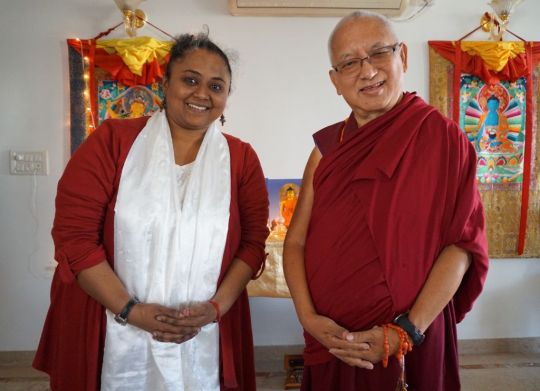
Lama Zopa Rinpoche with FPMT India national coordinator Deepthy Shekhar in Bangalore, India, December 2016. Photo by Ven. Losang Sherab.
In 2014, Indian FPMT students heard Malaysian and Singaporean students chant Lama Zopa Rinpoche’s name mantra in Mundgod and had the wish to learn how to do the same. Ven. Kabir Saxena, now director of Maitreya Buddha Project Kushinagar, suggested that they use an Indian tune instead, since the mantra is in Sanskrit. A Sanskrit chant teacher helped them to compose a tune for the mantra and Indian students were later able to offer this to welcome Rinpoche into the teaching hall when Rinpoche was visiting Bangalore in December 2016.
FPMT India national coordinator Deepthy Shekhar recently shared this beautiful recording of her chanting this mantra for the use of all of Rinpoche’s students.
https://shop.fpmt.org/Lama-Zopa-Rinpoche-Holy-Name-Mantra–MP3-Download-_p_3625.html
Lama Zopa Rinpoche’s name mantra is available to download, and all are welcome to enjoy and utilize the lovely chant offered by Deepthy.
FPMT Education Services makes many other commonly used mantras available for free download. All are welcome to peruse and freely utilize what’s available.
Through comprehensive study programs, practice materials, training seminars, and scholarships, FPMT Education nourishes the development of compassion, wisdom, kindness, and true happiness in individuals of all ages.
- Tagged: deepthy shekhar, mantras, nama mantra
- 0
19
Basic Program Progress, Completions, and Opportunities
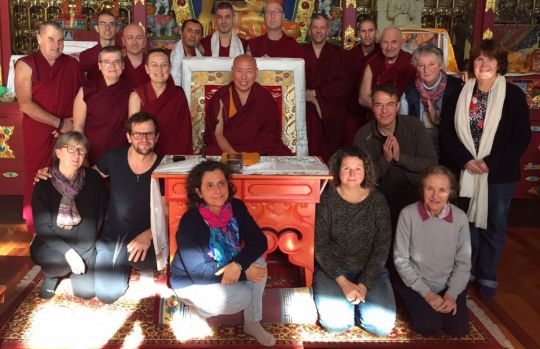
Final session of Nalanda Monastery’s second Basic Program, December 2016. With BP teacher Geshe Jamphel Gyaltsen; BP coordinator Ven. Rigchog (back row, fifth from the right) and their three interpreters, for the English: Katie Fradet (center front); for the Spanish: Montse Lobett Brandt (front row, first on the left); and for the French: Ven. Dorje. Some students were not present for this final session.
FPMT Education Services would like to share some news about Basic Program progress and announce a wonderful new online opportunity. The Basic Program (BP) was designed by Lama Zopa Rinpoche for students who wish to progress beyond foundational level study and practice. It offers an introduction to the philosophical aspects of the Tibetan Buddhist Gelugpa tradition; a substantial practice component balances this scholarly focus, ensuring a well integrated education.

Ven. Sangye Khadro.
Denmark
Tong-nyi Nying-je Ling (Center for Wisdom and Compassion), Copenhagen, will start its first BP at the end of January, taught by resident teacher Ven. Sangye Khadro, Masters Program graduate and In-Depth Buddhism registered teacher. The first semester consists of five monthly weekends and a one-week study-retreat. Offered in English, the video recordings and course materials will also be available online. This is an exclusive opportunity for students worldwide to receive BP teachings from a perfectly qualified Western teacher!
New Zealand
While their second BP is already in progress, Dorje Chang Institute (DCI), Auckland, New Zealand, saw four students complete their first Basic Program with the three-month review final exam: BP interpreter Rinchen Dhondup, the first ever Tibetan interpreter to participate in the review and final exam, DCI spiritual program coordinator Ven. Gyalten Wangmo, who facilitated the review in close cooperation with Education Services, and DCI’s two senior BP discussion group facilitators, Murray Wright and Simon Harrison, both FPMT registered teachers.
Interestingly, as Education Coordinator of (then) Central Office (now known as FPMT International Office) as early as 1992, Murray presented the first proposal outlining Lama Zopa Rinpoche’s wish for a Basic Program, giving the initial curriculum shape and collecting texts, translations and course materials. Little did he know that he’d participate in the program and complete the final exam some twenty-five years later! All four have put a lot of effort and energy into their review and did very well in their exam. We extend our congratulations to BP teacher Geshe Wangchen on the successful completion of his first BP.
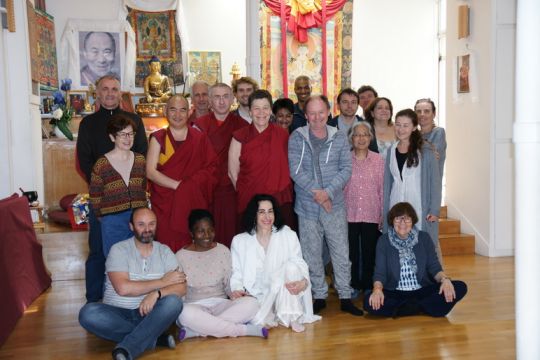
Centre Kalachakra’s last class of their second BP with teacher Geshe Dakpa Tsondu, center director Ven. Elisabeth Drukier (center), BP Coordinator Virginie Breit (second right, back row), and interpreter Lesley (fifth from right, back row). August 2016, Paris, France.
France
In France, Centre Kalachakra in Paris, which offers an excellent and well attended Basic Program that includes meditations, discussions and retreats, had six students complete the review and final exam of their second BP this December.
Nalanda Monastery in Lavaur will complete its second BP with the three-month review, final exam, and the three-month lamrim retreat in 2017. About ten students are expected to graduate from their outstanding five-year residential Basic Program.
Please rejoice that so many students around the world dedicate themselves to intensive Dharma study, and several succeed in completing FPMT’s In-Depth education programs.
Through comprehensive study programs, practice materials, training seminars, and scholarships, FPMT Education nourishes the development of compassion, wisdom, kindness, and true happiness in individuals of all ages.
- Tagged: basic program
- 0
12
‘Smashing the Delusions,’ A Living in the Path Module
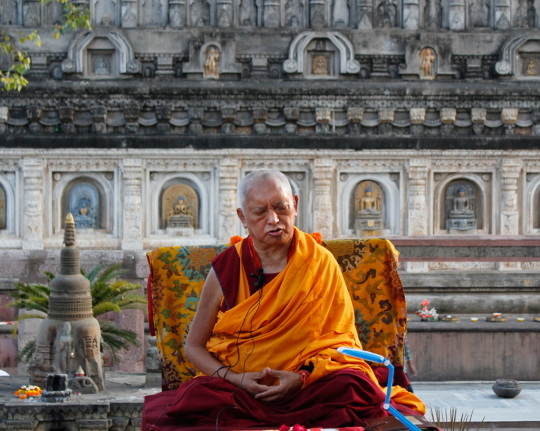
Lama Zopa Rinpoche giving the oral transmission of the Vajra Cutter Sutra at the Mahabodhi Temple, Bodhgaya, India, March 2015. Photo by Ven. Losang Sherab.
Toward the end of the Vajra Cutter Sutra, the following verse is found:
A star, a defective view, a flame,
An illusion, a drop of dew, a bubble,
A dream, a flash of lightning, a cloud:
See causative phenomena as such.
In “Smashing the Delusions,” a module of the Living in the Path program, Lama Zopa Rinpoche explains the meaning of this often recited verse. In these teachings Rinpoche urges us to practice, in our daily lives, mindfulness of how we ourselves and all the objects of our attachment, anger, and ignorance are impermanent and empty of true existence.
In a short video Ven. Lhundup Jamyang provides a brief introduction to this verse and explains how to see causative phenomena as impermanent and empty of inherent existence.
“Watch “Smashing the Delusions” on YouTube:
https://youtu.be/zQ_hbAWMt-8
All of the modules of Living in the Path program are available on the FPMT Online Center. This program is ideal for anyone who wishes to deepen their personal practice and develop the realizations of the path to enlightenment by relying on Lama Zopa Rinpoche’s heart advice and teachings. As the teachings often assume familiarity with the lam-rim, participants are recommended to have previously received teachings in the Tibetan Buddhist tradition.
Ven. Lhundrup Jamyang attended a ten-day introductory Buddhist course at Tushita Meditation Centre in Dharmasala, India, in 1997 and took ordination in 2000. She completed the five-year FPMT Basic Program at Chenrezig Institute in Australia and is currently completing the six-year Masters Program at Lama Tzong Khapa Institute in Italy. Ven. Jamyang is an FPMT registered teacher.
Living in the Path is an FPMT program taught exclusively by Lama Zopa Rinpoche, spiritual director of the FPMT. Plans are underway to also draw from the teachings of Lama Yeshe, FPMT’s founder, to offer a program that preserves the entire FPMT lineage.
5
The Method to Transform a Suffering Life into Happiness
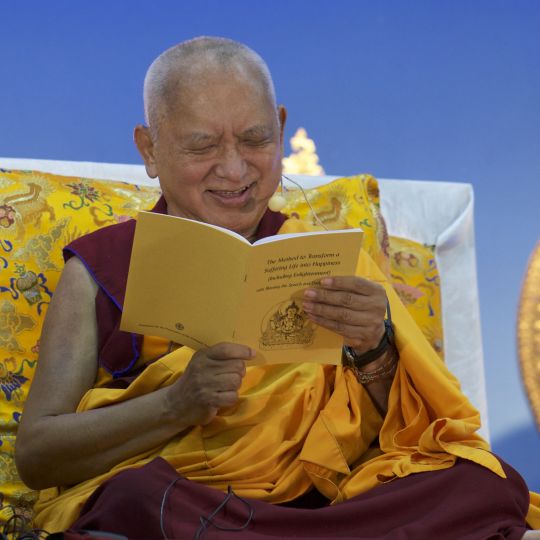
Lama Zopa Rinpoche reading from The Method to Transform a Suffering Life into Happiness, April, 2016. Photo by Bill Kane.
Over the past couple of years, Lama Zopa Rinpoche has put a great deal of emphasis on the practice The Method to Transform a Suffering Life into Happiness (Including Enlightenment).
In this practice, Rinpoche has carefully compiled, and in many cases provided translation for, the prayers, practices, and meditations needed to start one’s day, or activities, with a perfect Dharma intention and bodhichitta motivation. While mornings are an ideal time to set up one’s aspirations for the day, students are encouraged to engage in this practice at any time, whenever one is able.
The Method to Transform a Suffering Life into Happiness (Including Enlightenment) is available in English, French, Italian, and Vietnamese and students can also access a commentary by Lama Zopa Rinpche on this practice. Additionally, the module “The Method to Transform a Suffering Life into Happiness” from the Living in the Path program is an excellent way to delve deeper into this practice.
Through comprehensive study programs, practice materials, training seminars, and scholarships, FPMT Education nourishes the development of compassion, wisdom, kindness, and true happiness in individuals of all ages.
29
Advice Regarding Gurus
In FPMT centers, a great deal of devotion can be found with respect to the spiritual teacher (guru). A short booklet, available through the FPMT Foundation Store, Advice Regarding Gurus, introduces newcomers to this practice and explains why such emphasis is placed on establishing and maintaining a positive relationship with a guru.
Long-time student Ven. René Feusi explains, “Although you can learn a lot from books, if you want to become excellent in any field of knowledge, you have the best chance of success if you have a qualified teacher. This is true if you aim to become a ballet dancer, a pianist, a pilot, a craftsman, a scientist, etc. Likewise, if you aspire for spiritual development, your progress will be safer and faster if you are under the guidance of a qualified guru.”
Many other resources are available to those wishing to delve deeper into the practice of guru devotion. In particular, FPMT students are encouraged to explore:
- The Heart of the Path: Drawing from nearly fifty teachings, this is a lengthy collection of Lama Zopa Rinpoche’s teachings on guru devotion.
- Lama Zopa Rinpoche’s “Advice on Guru Devotion.” In this short and poetic composition, Lama Zopa Rinpoche outlines the essence of guru devotion and includes a beautiful dedication.
- Discovering Buddhism, Module 4: The Spiritual Teacher
- Living in the Path: Guru is Buddha
Through comprehensive study programs, practice materials, training seminars, and scholarships, FPMT Education nourishes the development of compassion, wisdom, kindness, and true happiness in individuals of all ages.
- Tagged: guru devotion, spiritual teachers
- 0

Lama Yeshe teaching at Olinda, Australia, 1976. Lama Photo courtesy of Lama Yeshe Wisdom Archive.
This week many of us head into a long holiday weekend with family and friends. We’d like to share an excerpt from Lama Yeshe’s Christmas teachings originally published by Wisdom Publications in 1978 under the title Silent Mind, Holy Mind.
This is the week of Holy Jesus’ birth, and I suggest that in honor of this special event we make some sort of celebration. But we should try to make it meaningful. It should not be some sort of physical sensation, bringing only more confusion and superstition to our minds.
For a Christmas celebration to be a good one, it must be of a truly religious nature. Jesus came to this Earth and presented his teachings, but worldly beings completely disregard this fact. For them, Christmas means – first and foremost – spending money, buying presents, and creating confusion. Such confusion is entirely of our own making. We have the power to make Christmas meaningful, peaceful, and truly religious, but instead of using this power we succumb to worldly negative energy. We go shopping to buy presents, but this is not done with anything even resembling a loving attitude. We think, “I really must buy something for my sister, because if I don’t give her anything, maybe she won’t like me anymore. Maybe she won’t give me anything either.” Or, “I better not get my friend a cheap present, or I might not get anything valuable back from him next year.” Such thoughts are extremely negative, leading to nothing but dissatisfaction. They are totally involved with egotistic and immature notions about what true happiness is. They have nothing whatsoever to do with religion.
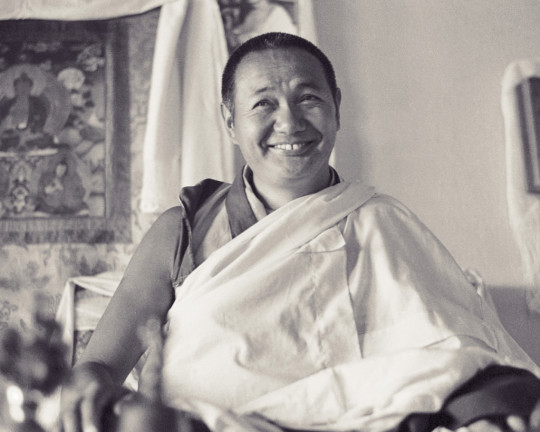
Lama Yeshe teaching at Kopan Monastery, Nepal, 1974. Photo by Ursula Bernis, courtesy of Lama Yeshe Wisdom Archive.
True religion brings peace and satisfaction to the mind. Actions that arouse only confusion serve no religious function at all. They stem instead from a political mind that thinks, “If I give this, I’ll get that in return.” Such a mind is extremely immature. It delights when many presents are received, and is depressed when expectations go unfulfilled. What difference, then, is there between such a mind and that of a small child? We consider ourselves to be grown up, but our actions and attitudes show us to be little different from our children. They exaggerate the importance of receiving gifts, and so do we. In fact, their exaggerated expectation of their minds of confusion and dissatisfaction are mainly developed by watching us. If we were to act in a consistently mature and meaningful way, our children would also become peaceful. We sometimes think that they are naturally berserk, and that we are something special but this is not so. Check up and see exactly what happens when a holiday approaches. We are the ones who create the commotion. The first thing that happens at the beginning of a holiday is that husband and wife, brother and sister and so forth begin to fight with one another. Be honest, and investigate the truth of this. I am not trying to be excessively negative; just check up and see if this is true or not. Holiday bickering has so much jealousy in it, “Let me see, what did you get? What did you get?” Such a dualistic mind is totally submerged in selfishness and wrong conceptions.
This deluded behavior is not common only to one type of culture. It can be found everywhere. Similarly, the antidote to this confusion is not taught merely in Buddhism. All religions strive to counter unsatisfactory, confused attitudes and bring us peace of mind.
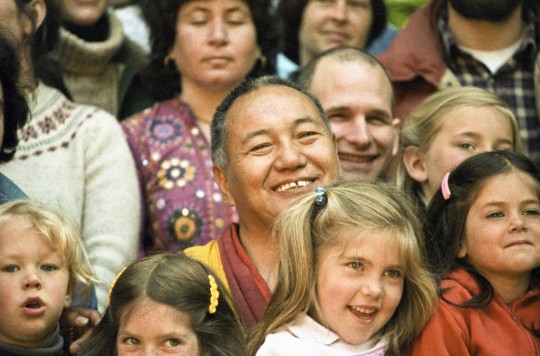
Lama Yeshe with children and students in California, 1983. Photo courtesy of the Lama Yeshe Wisdom Archive.
It is characteristic of materialistic people that they believe their happiness and frustration to be totally dependent on external phenomena and possessions. If they do not receive enough ice cream and cake they are despondent: “I feel so empty. This Christmas has been such a flop I could die!” For them, the success or failure of a religious holiday depends entirely on material things. They cannot discover peace and happiness within their own consciousness, depending instead on some external, physical sign of “love.” It does not matter how much they might profess to be spiritual; their minds are completely obsessed by the gross, material level of reality….
When Jesus was living on earth, there were no churches and such. His religion was not divided up into many groups and societies with people saying, “I’m a member of this sect; what denomination are you?” Things had not yet tightened up to the point where the religious follower felt compelled to choose one path or another. In this respect, at least, the people were much more liberated than we are today. Whatever they did in terms of their religion was done honestly and sincerely. Nowadays when you ask someone why he follows a particular religious tradition, he is likely to say, “Because my father did,” or “Because that church is near my house.” It is ridiculous to follow a particular set of teachings for these reasons. Others belong to a certain religion because it has the largest congregation in town. This also has nothing whatsoever to do with the true spirit journey.
One solitary being sincerely actualizing the everlasting peaceful path to liberation is more precious than a whole host of confused beings shouting. “This is my religion!” Such people may easily criticize the sincere seeker, despising him for holding beliefs contrary to those of the multitudes. Sheer numbers count for nothing in spiritual terms. It does not matter how many people are engaged in building a church, temple, or monastery; if they lack true religious feeling, their actions mean nothing….

Jesus Christ, from Lama Yeshe’s “Silent Mind, Holy Mind”
Therefore, if our Christmas celebration is to be truly religious, it is important to remember who Jesus was, what he did and what he stood for. In this way we can understand how he benefited so many sentient beings and why he has been such a positive force, not merely in his own time, but throughout the last 2,000 years, and up to the present day.
Jesus had exceptionally great compassion. It is very good to check up on this fact, and consider it deeply.
If the thought comes to our mind, “I must gain his realizations and become as compassionate as he was,” then this is the most perfect basis on which to have a celebration of his birth. With this feeling in our hearts, a Christmas festival can be very meaningful and worthwhile.
Silent Mind, Holy Mind is currently out of print but available as a spiral bound paper copy from the Lama Yeshe Wisdom Archive.
Lama Tsongkhapa Day, or Ganden Ngamchoe, is a celebration of the anniversary of Lama Tsongkhapa’s parinirvana. It is celebrated on the 25th day of the 10th month in the Tibetan calendar. This year, Lama Tsongkhapa Day falls on Friday, December 23. Students may like to consider including Lama Tsongkhapa practice in their holiday weekend.
- Tagged: christmas, lama yeshe, silent mind holy mind
- 0
15
Celebrate Lama Tsongkhapa Day on December 23
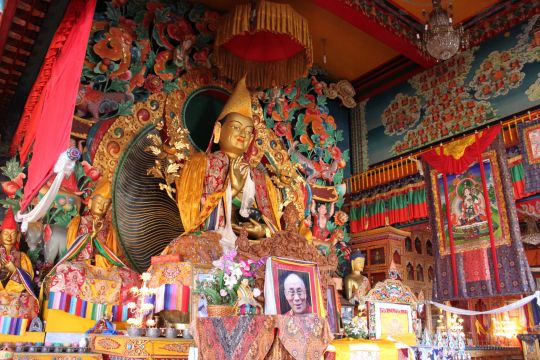
Statue of Lama Tsongkhapa at Kopan Monastery. Photo by Tom Truty.
Lama Tsongkhapa Day, or Ganden Ngamchoe, is a celebration of the anniversary of Lama Tsongkhapa’s parinirvana. It is celebrated on the 25th day of the 10th month in the Tibetan calendar. This year, Lama Tsongkhapa Day falls on Friday, December 23.
Lama Tsongkhapa (1357-1419) was a Tibetan Buddhist master whose studies and meditations in all the major schools of Tibetan Buddhism resulted in the founding of the Gelugpa lineage.
“In Gelug regions, Lama Tsongkhapa Day is definitely an important celebration,” shared Joona Repo, translation coordinator for FPMT International Office, in a recent email. “In Lhasa the Barkhor is packed with people circumambulating the Jokhang.
“In India, people celebrate it too, of course. In Mundgod and Bylakuppe, they light up all the temples and assembly halls with Christmas lights.”
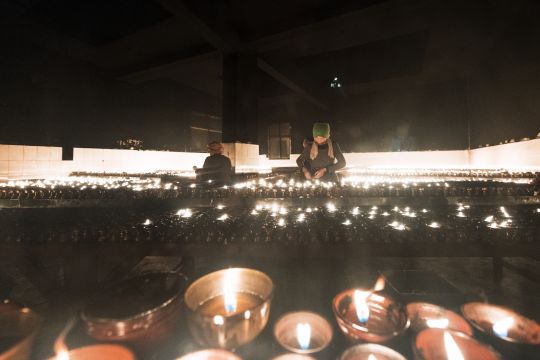
Offerings of lights on Lama Tsongkhapa Day (Ganden Ngamchoe), Lhasa, Tibet. Photo by Matt Lindén (mattlinden.co.uk).
There are many practices you can do to create merit on this special day! The main practice, recommended by Lama Zopa Rinpoche, is Lama Chöpa. The FPMT Foundation Store makes this practice available in hardcopy and as a downloadable PDF. If you are unable to do Lama Chöpa, Lama Tsongkhapa Guru Yoga is also recommended.
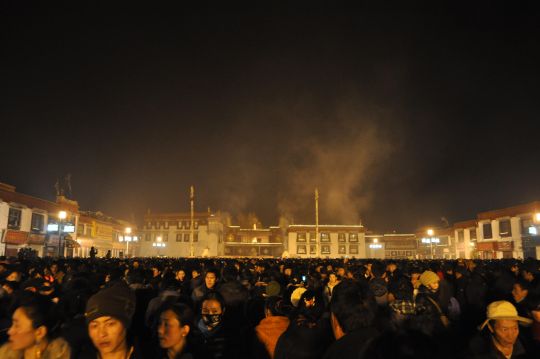
The Jokhang on Lama Tsongkhapa Day (Ganden Ngamchoe), Lhasa, Tibet. Photo by Matt Lindén (mattlinden.co.uk).
Additionally, there are other practices students are encouraged to do, as you are able. Consider some of the following:
English
- 1000 Offerings to Lama Tsong Khapa
- Extensive Offering Practice
- “The Glorious One of the Three Worlds” (English Version of “Palden Sa Suma”)
- “A Hymn of Experience” by Je Tsongkhapa
- “Destiny Fulfilled”
- “Prayer for the Flourishing of Je Tsongkhapa’s Teachings” (a4 version)
“Prayer for the Flourishing of Je Tsongkhapa’s Teachings” (letter version) - Lama Tsongkhapa’s Secret Biography
“Dependent Arising: A Praise to the Buddha”
French
- Prière pour le développement de Lama Tsongkhapa (lecture)
- Prière pour le développement de Lama Tsongkhapa (livret)
Tibetan
- 1000 Offerings to Lama Tsongkhapa
- “Palden Sa Suma” (Tibetan Version of “Glory of the Triple Ground”)
- Lama Tsongkhapa’s Secret Biography
You can read more about this advice, plus a teaching from Lama Zopa Rinpoche about Lama Tsongkhapa Day.
- Tagged: buddha day, holy day, lama tsongkhapa day
- 0
8
FPMT’s Inner Job Description: How to Be Real Professionals
What Is “Dharma Work?”
Any work done with the teachings of the Buddha alive in the heart is “Dharma work.” Some of us share the precious and uniquely challenging opportunity of working or volunteering for a Dharma organization. We might imagine a pure land of Dharma talk by the water cooler and pujas at lunch, but our jobs hardly feel holy all of the time. Whether rewiring the office for a new phone system, crunching numbers for our annual financial reports, helping a coworker navigate a divorce, or volunteering for sixteen hours straight at a fundraising event, we’ve all been pushed outside of our comfort zones and areas of expertise.
“If you have many activities, many responsibilities, and if you think of this as a burden, then stress comes. Even if you are working, if you look at all this as burden, your mind is not happy. Lung and stress come, and your mind becomes so unhappy.” Lama Zopa Rinpoche explained during a talk to an FPMT center in 2003. “Rather than taking all of this as a burden, if you look at this as an opportunity to be useful, and see that you are useful for other sentient beings, and look at all these activities and responsibilities as a positive opportunity and think, ‘I am so fortunate to benefit others,’ then that’s one technique to stop squeezing the mind and developing lung (which also can bring high blood pressure and badly affect your health). Thinking of the benefit you are able to offer through all your work generates joy and happiness in your heart.”
The Inner Job Description Card (Mindfulness Practice Tool) was created to help you track your progress throughout the day as you attempt to develop your inner professional and subdue your outer expressions of ignorance, anger, attachment, selfish motivation, etc. As Lama Zopa Rinpoche explains, “You have all these external professions—how to do this, how to do that from school, college, university—but without inner professionalism: how to live life, how to do everything mentally, how to do everything—business, professional activity, whatever you do—with pure attitude, positive mind, non-ignorance, non-anger, non-attachment, especially with the non-selfish mind.”
Inner Job Description Cards
- Inner Job Description Card (Mindfulness Practice Tool) a4 format
- Inner Job Description Card (Mindfulness Practice Tool) letter format
- “How to Be a Real Professional” by Lama Zopa Rinpoche
Students can also attend the Inner Job Description Service Seminar when available. Find out more on our Service Seminar page.
Through comprehensive study programs, practice materials, training seminars, and scholarships, FPMT Education nourishes the development of compassion, wisdom, kindness, and true happiness in individuals of all ages.
- Tagged: dharma work, inner job description
- 0
1
Resources for Creating and Offering to Holy Objects

Beautiful offerings to holy objects at Buddha Amitabha Pure Land, Washington State, USA. Photo by Chris Majors.
The creation of holy objects for world peace is a key priority among Lama Zopa Rinpoche’s Vast Visions for the FPMT organization. FPMT Education Services makes available many resources related to creating and offering to holy objects.
Holy objects purify negativities and create merit for all who come into contact with them. Lama Zopa Rinpoche has explained, “My wish is for FPMT to build many holy objects everywhere, as many as possible. Making it so easy for sentient beings to purify their heavy negative karma and making it so easy for sentient beings to create extensive merit. Which makes it so easy to achieve the realizations of the path and so easy to achieve liberation and enlightenment.”

Holy objects and extensive offerings at Kachoe Dechen Ling. Photo by Chris Majors.
Holy Object Resources
- Prayer Wheels
- Prayer Flags
- Relics
- Stupas
- Statues
- Thangkas
- Tsa-Tsas
- Information on microfilm for stupas and prayer wheels
- Guide for filling and consecrating your holy object
- To order Buddhist microfilm
Further Reading on Holy Objects
- Lama Zopa Rinpoche’s advice regarding holy objects can be found on his Advice Page as well as on the Lama Yeshe Wisdom Archive’s Online Advice Book.
- “Benefits of Having Many Holy Objects” by Lama Zopa Rinpoche
- “The Benefits of Making Prayer Wheels” by Lama Zopa Rinpoche
- Benefits and Practices Related to Stupas and Statues Part 1
- Benefits and Practices Related to Stupas and Statues Part 2
- Benefits and Practices Related to Stupas and Statues Part 3
- “An Essay on Relics” by Lama Zopa Rinpoche
- “Essential Mantras for Holy Objects” by Lama Zopa Rinpoche
- Lama Zopa Rinpoche’s Advice on Circumambulation compiled by Ven. Sarah Thresher
- Lama Zopa Rinpoche translated “Padmasambhava’s Instruction on Offerings to Stupas,” which details the benefits of prostrating to, circumambulating, making offerings, and offering service to stupas.
- The Wheel of Great Compassion: The Practice of Prayer Wheel in Tibetan Buddhism edited by Lorne Ladner, foreword by Lama Zopa Rinpoche
-
Extensive auspicious offerings are made to holy objects by many FPMT centers, projects and services around the world. Please rejoice in some of this amazing activity.
You can explore more resources and information about holy objects:
fpmt.org/education/practice/holy-objects
By contributing toward the building of statues, stupas, prayer wheels and large thangkas the Holy Objects Fund contributes to world peace and harmony in a very unique way.
Through comprehensive study programs, practice materials, training seminars, and scholarships, FPMT Education nourishes the development of compassion, wisdom, kindness, and true happiness in individuals of all ages.
- Tagged: holy objects, prayer wheels, relics, statues, stupas, thangkas, vast visions
- 0
24
Making Your Holiday Meals Meaningful
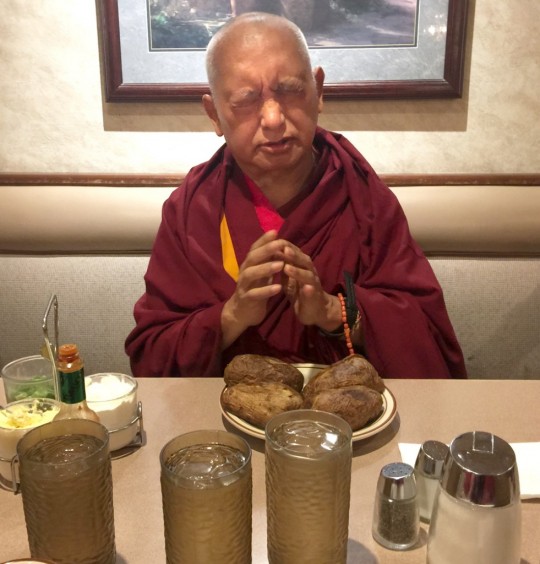
Lama Zopa Rinpoche blessing and offering a meal in California, November, 2015
This time of year means, for many, an increase in festive meals celebrated with friends and family. There are a variety of ways to enjoy your meal while still practicing virtue.
FPMT Education Services makes available a collection of practices, Food Offering Practices, which includes an extensive food offering practice, general food offering prayers, and the yogas of eating food according to Hinayana, Mahayana sutra, and Mahayana tantra.
Whatever your traditions this time of year, you can make each meal a meaningful offering for yourself and others. Enjoy!
Through comprehensive study programs, practice materials, training seminars, and scholarships, FPMT Education nourishes the development of compassion, wisdom, kindness, and true happiness in individuals of all ages.
- Tagged: food offering, food offering practice, offering food
- 0
- Home
- News/Media
- Study & Practice
- About FPMT Education Services
- Latest News
- Programs
- New to Buddhism?
- Buddhist Mind Science: Activating Your Potential
- Heart Advice for Death and Dying
- Discovering Buddhism
- Living in the Path
- Exploring Buddhism
- FPMT Basic Program
- FPMT Masters Program
- FPMT In-Depth Meditation Training
- Maitripa College
- Lotsawa Rinchen Zangpo Translator Program
- Universal Education for Compassion & Wisdom
- Online Learning Center
- Prayers & Practice Materials
- Overview of Prayers & Practices
- Full Catalogue of Prayers & Practice Materials
- Explore Popular Topics
- Benefiting Animals
- Chenrezig Resources
- Death & Dying Resources
- Lama Chopa (Guru Puja)
- Lama Zopa Rinpoche: Compendium of Precious Instructions
- Lama Zopa Rinpoche: Life Practice Advice
- Lama Zopa Rinpoche Practice Series
- Lamrim Resources
- Mantras
- Prayer Book Updates
- Purification Practices
- Sutras
- Thought Transformation (Lojong)
- Audio Materials
- Dharma Dates – Tibetan Calendar
- Translation Services
- Publishing Services
- Teachings and Advice
- Find Teachings and Advice
- Lama Zopa Rinpoche Advice Page
- Lama Zopa Rinpoche: Compendium of Precious Instructions
- Lama Zopa Rinpoche Video Teachings
- ༧སྐྱབས་རྗེ་བཟོད་པ་རིན་པོ་ཆེ་མཆོག་ནས་སྩལ་བའི་བཀའ་སློབ་བརྙན་འཕྲིན།
- Podcasts
- Lama Yeshe Wisdom Archive
- Buddhism FAQ
- Dharma for Young People
- Resources on Holy Objects
- Ways to Offer Support
- Centers
- Affiliates Area
- Teachers
- Projects
- Charitable Projects
- Make a Donation
- Applying for Grants
- News about Projects
- Other Projects within FPMT
- Support International Office
- Projects Photo Galleries
- Give Where Most Needed
- FPMT
- Shop
Translate*
*powered by Google TranslateTranslation of pages on fpmt.org is performed by Google Translate, a third party service which FPMT has no control over. The service provides automated computer translations that are only an approximation of the websites' original content. The translations should not be considered exact and only used as a rough guide.Don’t think of Buddhism as some kind of narrow, closed-minded belief system. It isn’t. Buddhist doctrine is not a historical fabrication derived through imagination and mental speculation, but an accurate psychological explanation of the actual nature of the mind.









